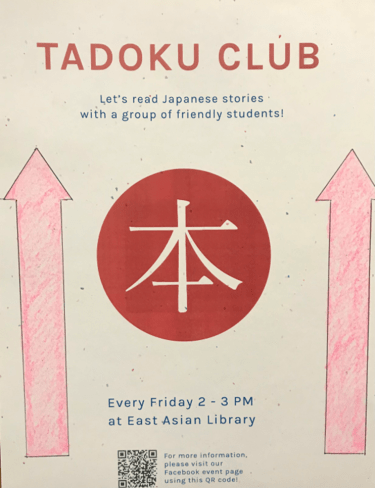April 1, 2022
Tadoku Club Returns
Keiko Hill

Tadoku Club poster
In the 2021 autumn quarter Tateuchi East Asia Library was pleased to welcome back the Tadoku Club and its enthusiastic Japanese language learners for on-site meetings.
Asian Languages and Literature Teaching Professor Izumi Matsuda-Kiami founded the Tadoku Club five years ago. Complementing the patient, intensive reading often associated with language learning, tadoku 多読, or extensive reading, encourages learners to read more widely and fluently. The club has traditionally met in the Tateuchi East Asia Library, which provides members with a dedicated collection and reading space, currently in the reading room. It was popular among students, who could drop by to enjoy their favorite books. Professor Matsuda-Kiami expanded the concept to create a for-credit Tadoku course, offered each spring quarter since 2019.
With libraries closed after March 2020 due to the pandemic, the Tadoku course and club both went online. The spring quarter course, which usually relies on Tateuchi EAL’s physical book collection, came close to cancellation. We were glad to help Professor Matsuda-Kiami salvage it by rapidly purchasing and processing a substitute e-book collection (see the UW Libraries’ May 2020 blog post). Although her virtual Tadoku course was a success, she had doubts about taking the club online: would students want to sit reading online together, with minimal interaction? It turned out that with the isolation of the pandemic, students enjoyed seeing their friends once a week; and the online format meant they could do so from anywhere in the world. Eight students participated in the autumn 2020 online Tadoku Club.
In autumn 2021, students returned to campus for in-person classes. Weighing up options for the Tadoku Club, Professor Matsuda-Kiami communicated with Tadoku instructors at other colleges, some of whom had already begun their fall teaching and could share experiences. She concluded that the pros of running the club on-site outweighed the cons. In addition, she checked with Japanese Studies Librarian Azusa Tanaka on the library’s COVID-19 protocols. Since participants didn’t read aloud, give presentations, or hold discussions, following safety precautions would not be an issue.
We were all pleasantly surprised to see more than twenty students show up at the Tateuchi EAL reading room for the first day of in-person Tadoku Club. Professor Matsuda-Kiami believes the strong turnout reflects students’ isolation during the pandemic and their eagerness to meet with peers to share reading experiences.
Holding the Tadoku Club in person also enables instructors to better support students. Professor Matsuda-Kiami mentioned the importance of observing students’ expressions as they read, which helps her suggest reading materials of an appropriate level. This is difficult to do online. While Tateuchi EAL’s e-book collection has been growing, our print resources are still far richer, especially when it comes to illustrated books suitable for beginners. One student described the pleasure they gained from reading in Tateuchi EAL’s atmospheric reading room. Instructor and students enjoyed being physically together, turning the pages of physical books.
Though glad to be handling print books again, Professor Matsuda-Kiami emphasized the benefits that e-books have brought to her teaching. Since they need to be always available, our dedicated Tadoku books are non-circulating; e-books, by contrast, can be read anywhere, anytime. Print and electronic formats, each with its strengths, will both play an important role in our next phase, the hybrid world.


